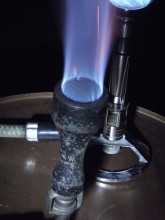Without seeing the actual photograph, or knowing which specific ingredients have been added to a test tube, it is impossible to surmise exactly which of these substances will be the least likely to pass into a test tube during a filtration process. Since all substances have their own properties, including viscosity (for example, viscous motor oil would be filtered more slowly than pure water, or vinegar), and each substance may be contaminated with trace elements, such as dirt, these variables will affect the how successfully or unsuccessfully any ingredient will behave during a filtration process.
A substance that is contaminated with anything grainy that clogs the tiny holes in a filter will not filer successfully - the grains will be left behind. Of course, some forms of filtration are designed to filter out adulterants, such as dirt, to get a purer substance that will pass into a science laboratory test tube.
Science Experiment Facts
• A proper laboratory apparatus will assist a novice or experienced scientist with setting up a filtration process that is then attached to a glass test tube. Test tubes are thin glass beakers that are shaped in a long, tubular form; these test tubes may be heated over Bunsen burners or other flat burners, which are normally a standard part of a proper laboratory apparatus. Other basic components of a proper science laboratory apparatus include pipettes, droppers, lab coats, gloves (to protect scientists from pathogens and chemicals), and triangular clay forms that are used to hold beakers in place while they are being heated up.
• A proper science experiment will feature an initial hypothesis, or educated guess, that is then proven or disproven through observation and conclusions based on an experiment.
To learn more about test tubes and filtration, pick up a science books and study these processes. There may also be tutorials and online videos that detail experiments performed with filtration systems and science lab beakers.
A substance that is contaminated with anything grainy that clogs the tiny holes in a filter will not filer successfully - the grains will be left behind. Of course, some forms of filtration are designed to filter out adulterants, such as dirt, to get a purer substance that will pass into a science laboratory test tube.
Science Experiment Facts
• A proper laboratory apparatus will assist a novice or experienced scientist with setting up a filtration process that is then attached to a glass test tube. Test tubes are thin glass beakers that are shaped in a long, tubular form; these test tubes may be heated over Bunsen burners or other flat burners, which are normally a standard part of a proper laboratory apparatus. Other basic components of a proper science laboratory apparatus include pipettes, droppers, lab coats, gloves (to protect scientists from pathogens and chemicals), and triangular clay forms that are used to hold beakers in place while they are being heated up.
• A proper science experiment will feature an initial hypothesis, or educated guess, that is then proven or disproven through observation and conclusions based on an experiment.
To learn more about test tubes and filtration, pick up a science books and study these processes. There may also be tutorials and online videos that detail experiments performed with filtration systems and science lab beakers.

